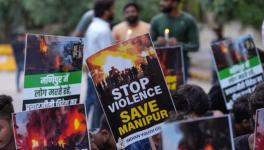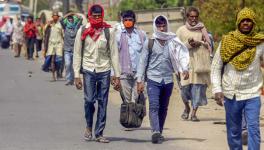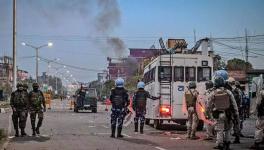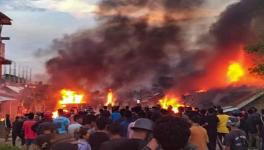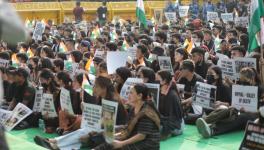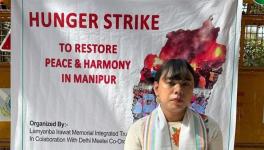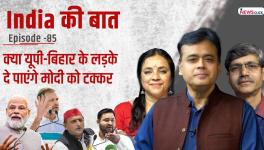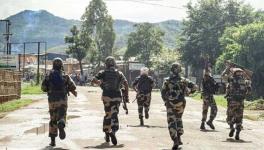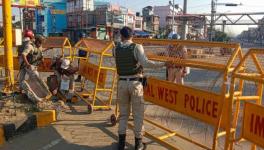Manipur: Three Bills and Ensuing Tensions in the Land of Jewels
In this interview, Binalakshmi Nepram, working with the Manipur Women Gun Survivors Network, provides a backdrop to the events leading up to the introduction of new three anti-migrant bills.
Manipur, “the land of jewels”, has witnessed conflict that is “as old as the hills in Manipur”. The recent point of contention is the introduction of three new anti-migrant bills that have furthered tensions between various ethnic groups and tribes, divided by the hill regions of Manipur and the valley. Though the bill strives to uphold and preserve the identities of people living in Manipur – both in the hill regions and the valley -- it has largely been perceived as anti-tribal; it has threatened the agency of the communities in the hill regions over their land. In this interview, Binalakshmi Nepram, working with the Manipur Women Gun Survivors Network, provides a backdrop to the events leading up to the introduction of these bills. She further elaborates that the tensions and differences over the bills have emerged due to the long history of tension and distrust amongst communities, compounded by poor governance in the region, as well as the engineering of conflicts by national political parties. Manipur, with its rich confluence of diverse identities, is faced with the challenge to negotiate between these and its land masses.
Rough Transcript:
Prabir: Hello and welcome to Newsclick. Today we have with us, Binalakshmi Nepram, who works with the Manipur Women Gun Survivors Network. Good to have you with us. Manipur has been in flames for almost last five years that I remember. Lot of ethnic conflicts particularly between, what is now being termed as hill tribals of the Meitei’s and the Naga’s and the kuki’s, blockades etc. The recent trigger seems to be this three bills, which are being termed as the anti-immigration bill. But which seems to have also made the hill tribals very uneasy if we use the term for the nagas and the kukis. So the hill people seem to be very unhappy about this that the state government will decide who can buy land even in the hills and the hill committee which exists would not have a role. So, do you think that this is really a conflict which is going to lead to further tensions or do you think is now with the decision to discuss, re-evaluate these bills there is some possibility of coming together?
Binalakshmi Nepram (Bina): First of all, Manipur which translates as land of jewels is extremely resource rich area. It’s home to not just Kukis or Nagas or Meiteis, it’s home to 39 beautiful ethnic communities, some names which doesn’t even fall in the Kuki or Naga or Meitei. So, this place has not been in turmoil just for the last five years, it’s been in a state of turmoil since 1949, ever since it merged with the Union of India. It was a beautiful Asiatic kingdom which merged with the Union of India in 1949, which many constitutional experts call it ‘done under duress’, where our king was forced to sign the merger agreement in the summer palace in Shillong. So the conflict in Manipur is as old as the hills of Manipur or even beyond, you know. AFSPA was imposed in the Naga Hills in 1958 and parts of Naga Hills are also in Manipur and then in the Imphal Valley in 1980. So the state has been in a siege of tension for the last 6 decades. 20,000 people have died as per government of Manipur records, our records say it’s three times more. 20,000 widows of violence which we work with at the moment and these victims have not been just of the Meitei community, its Naga community, Manipuri Muslim community, Kuki community and the other communities which inhabit the particular, and which includes even Marwaris, which includes Nepalis, it includes many communities. Now the bill which is the bone of contention right now, the story started like this; in 2011, when the last census of India was prepared, the valley people of Manipur were shocked that they were becoming a minority. As per the 2011 census, the Manipuri Meitei population which is so-called the dominant, is no longer dominant, it is just about 700,000. The hill community, which consists all the ethnic community living in the hill, their also is almost quiet close to that, followed by the Nepali community of that equal number. So first of all, let me be very clear that the Meitei community is not the majority. If it’s the majority, it’s only by a few hundreds and thousands, not more. So when the Meitei community realized that they’ve become a minority in their own land, they started a committee and started telling the government of Manipur, something has to be done. Because there were some phenomenal growth, abnormal growth rates. Example, from 1950s to the 60s till 2011the growth in Manipur was 400% in populations. Even if you marry or elope or just have a baby, that’s not enough for the entire population to procreate in that time. So, experts found out there was an abnormal growth. The abnormal growths were also recorded in many districts, in the hills particularly Senapati district, Tamenglong district, Churachandpur district where there were 400% plus growth. So people were amazed why this is happening. So the civil society first alerted the government of Manipur to investigate this. Government of Manipur as decadent it has been for last many years and decades, they did not act upon it. So the valley people started getting worried. The reason is, if you look at Manipur, 90% of Manipur is hill area, only 10% is in the valley. But 66% of Manipur population is in the valley plus because there is no inner line permit in Manipur the way it is in Mizoram, Nagaland, Arunachal Pradesh. So, anyone can come from any part of the country or the world or buy land in that 10%. The hill district cannot be touched because according to British law, no one can buy land in the hills of Manipur. So the Manipuri Meitei population got really paranoid. That this is our only homeland, how do we ensure our survival because our rice fields started becoming decreasing. More and more houses were being built, if we have no rice how would we feed our population? So there was a fear psychosis. So they created this Joint Action Committee for inner line permit asking the government of Manipur and India to implement the inner line permit in Manipur. The way that when I go to Mizoram, you know I have to get an inner line permit, it cost 10 rupees even as a Manipuri when I go to Mizoram, as a Northeasterner I still had to get an inner line permit, same thing in Arunachal Pradesh. So the Manipuri people, particularly the valley area were asking for an inner line permit. It was not saying that it should be against the tribals of Manipur. It’s for anyone who comes and works or lives in Manipur, please have a permit so that they know who’s who. Plus at the same time, the same thing in Himachal Pradesh, you and I cannot buy land, Kashmir you cannot. So the valley people in Manipur, because of their fear they said please do something like this so that we can protect a little bit of our mother territory you know. That was all that was known as the movement for the inner line permit. It was never targeted towards the hill districts of Manipur, in fact it’d have benefited everyone you see. Now, the bill so since 2000, last you five years as you rightly pointed out, they’ve started small-small protest and again the government of Manipur, I know some of the officials completely lethargic, didn’t act on it. So it agitated the people, it angered the people and last year they started in July, a massive protest in the valley areas of Manipur as a result of which one student was shot dead. And because of the public pressure and the blockade which went on for three months, no two months, July, August 31st, government of Manipur passed the Protection of Manipur People’s Bill, 2015. When this bill was passed, the 60 members in the Manipur assembly, 40 are from the valley including people from the Muslim community and by the way the first Manipur chief minister is from the Muslim community. And the longest running, serving chief minister is a Tangkhul Naga, Rishang Keishing you know, so it’s not that only Meiteis have ruled Manipur you know. So anyway, so out of the 60 members, when they passed this bill it was not that there were no tribals in it, there were tribal ministers in it and so why didn’t they object at that time. If they’ve done their job then civil wouldn’t have, public wouldn’t have fought the way we are having now, right now.
Prabir: You know, to make this point, it seems to be little poorly drafted shall we say because the intention appears to have been keep outsiders of Manipur out and at least make it difficult for them to buy land if not register, various other provisions which are there. The one which has seemed to have split the hill people from the plains people have been the issue of the land one, the one which is the land revenue land bill which really seems to have no role for the hills committee and that seems to have made them feel, that this could then be used to take away, their land as well.
Binalakshmi: Absolutely. So, the present crisis actually is because of very bad governance. You know, it’s indeed very correct that many of the administration of Manipur as I state has been centered in the Imphal valley. The hill people of Manipur have a right to get angry and upset about what’s happening. This is precisely why we’re pushing the present government of Manipur, have the courage to apologize for their wrongs, rectify it, there have been severe misgovernance problems. So, which includes even the ministers from the hill areas, they themselves haven’t done. They will buy lands in Imphal valley, build a big houses, go once in a blue moon back to the hills. So, really we work in 300 villages in Manipur in both, hill and valley area, we work in 120 villages in Churachandpur for the last four years with women survivors so we know the issues, of how there’s no basic health care, the proper private, the hospitals in Manipur all are in Imphal, Universities all are in Imphal. So the hill people have a genuine problem of anger against what’s happening. But as I said, between the bill and the anger, that’s where the mix match is. Now everything came together and that’s why you feel its anti-tribal bill. The bill itself is problematic, that is why tomorrow we are convening to ensure that we see which are the problematic parts, let’s delete it.
Prabir: What we see in the reports, the parts which are “problematic”, don’t seem to be that irreconcilable. Because look at the both sides, both have a common agenda of not having outsider settle there and hill people are saying our permission should be taken before our land is given away and I think that’s a completely, you know legitimate demand. So this seems to have been more as you said rightly, a difference which has come from the long history of you know mistrust among the communities for whatever may be the historical reasons. More recent history than past history and that seems to have triggered off this, shall we say this kind of move
Binalakshmi: Yes, it is, it is. And vested elements, political elements have played upon the fears of both the valley and the hills. That is where the tragedy has ring. The hill and valley people of Manipur, if you really look at it, as I said Manipur has 39 different ethnic groups and there have been very long relationships between. If you really tried to identify me versus a Kuki or a Naga you cannot identify, we are all chinkis here. So, honestly you know. So, who is dividing us really, first of all. 18th century the Bengalis did it by bringing Vaishnavism there. Where our king was brainwashed and all ancient indigenous scripts were burnt. Yes. And that’s how Hinduism came to Manipur in the 18th century. So they couldn’t have the courage to walk up to the hills, so all the people in the valley because and the king passed a decree, if you are not a Hindu you’ll be punished. As a result, valley became a lot of Hindu is there you know. In the hills and then a century later British came and they brought with them missionaries and that’s how and they had the courage and the audacity to go up to the hills for whatever greed takes them to, to find their oil, their gas, their tea. So they went up to the hills and that’s where even uncle Muiwad the head of NSCIN whom I’ve met, he himself studied in Pettigrew College in Ukhrul which is the first college/high school ever setup in British times you see. So the hills became Christianized, the valley became Hinduised. Now the main rift between the hill and they valley is not so much as the present day in as much as with Hinduism came Caste system. Example, so my grandfather will not even touch egg. Fish is vegetarian but any other food is unclean food. So if the hill communities are eating beef or pork, it’s considered ‘bad food’. This is how the rift were created between the same group of people in the same area, religion has divided us. It’s not so much the bills right now as the religion more than 300 years back divided us between the hills and the valley. The British also did the inner line permit, that’s how they’ve put this inner line or this no one can buy land from the hills, so they have done this. And the Kuki community where actually used there was a cross border tribe, which the Kuki community were used by the British to act against the Nagas and the Meiteis too. So it is a lot of politics which was happening last, colonial politics which has resulted, yeah.
Prabir: Interior divide and rule which continues even till today.
Binalakshmi: Absolutely. And what the religious propagandist did followed by the, is now followed by National political parties. The present crisis in Manipur, as I said we believe that the hill communities of Manipur has a genuine right to protest and we are with them to get there because a wrong is a wrong, a right is a right and we will not be blind to that. But at the same time, the engineering of conflicts by National political parties should not be done away with. They are very much creating a part of this conflict creations and we will fight to the nail, I say play your politics but not at the cost that hill people versus valley people as if hill and valley ever fought in life. Nature fights? Nature never fights. Have you seen hill plunging at the valley? So it’s a very wrong way of and particularly, again when you say hill community you know, we’ve got as I said more than 37 beautiful different ethnic communities in the hill areas of Manipur. And everyone has their own special thing. Their common langua-fronka is Manipuri, you see. So there’s lot of various and of course every nation as Benedict Anderson says, a nation is a created one, you and I can create a nation. The Nagas have every right to ask for their Nagaland, the Kukis have every right to ask for their Kukiland. The Gurkhas every right to ask their, but at what cost and how do we do it? Because everyone wants their identity to be out there. Now the thing is, how do we negotiate? There’s different you know land masses identities is what we will have to put our minds and our hearts and our energy into so that we are able to resolve this conflicts, it is a conflict and not everything in conflict is bad. There are positive and negative conflicts.
Prabir: so contradictions rather than conflicts is what you should be really looking as the words and how to settle this contradictions within the parameters of the state, the communities, that’s what we really need to look at, that’s what you seem to be saying. Any last words of what you think is way forward in terms of the present contradictions which has arisen.
Binalakshmi: Absolutely. In fact, on 7th of June, the chief minister of Manipur together with 16 others including the home minister and the deputy chief minister who comes from the hill districts of Manipur, they met the home minister and they’ve come up with a beautiful resolution which says that the president of India as well as the Union home ministry is looking into, relooking into these bills. They are forming an expert panel of legal experts and other experts so that whatever new bill comes up as a result of it, should address both hill and valley concerns. So this is extremely important statement. How they turn it, is how we are watching. Conflict exist in life, in our homes, in our minds, in our communities, in our nation. How we resolve it is the wisdom, which will turn the direction of, the different communities and the people we work with, we lead, we form a part of. So as I said, there will always be vested elements to destroy the fabric of our ethnic groups and let politics play the political part but don’t do at the cost which makes a Nagas kill the Meiteis, or makes the Nagas kill the Kukis.
Prabir: Thank you very much Bina for coming over and having this discussion, we’ll continue to plague you on the issues of Northeast and what’s happening there from time to time. Thank you very much.
Binalakshmi: Thank you so much for giving our voice.
DISCLAIMER: Please note that transcripts for Newsclick are typed from a recording of the program. Newsclick cannot guarantee their complete accuracy.
Get the latest reports & analysis with people's perspective on Protests, movements & deep analytical videos, discussions of the current affairs in your Telegram app. Subscribe to NewsClick's Telegram channel & get Real-Time updates on stories, as they get published on our website.









